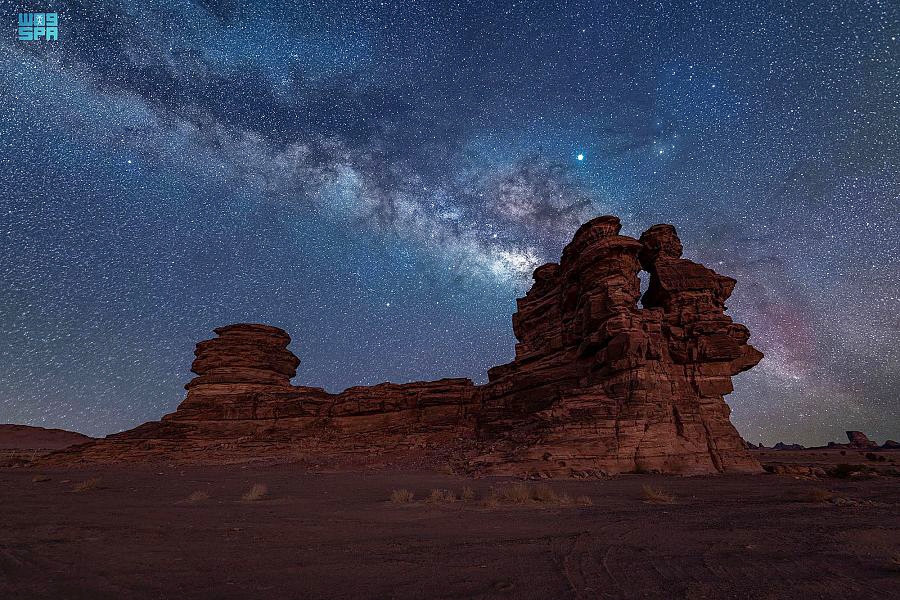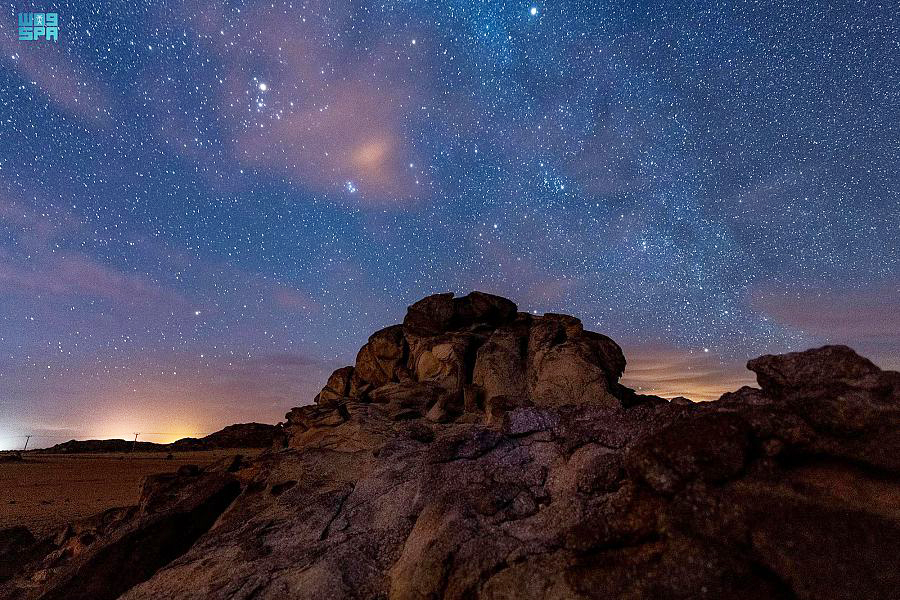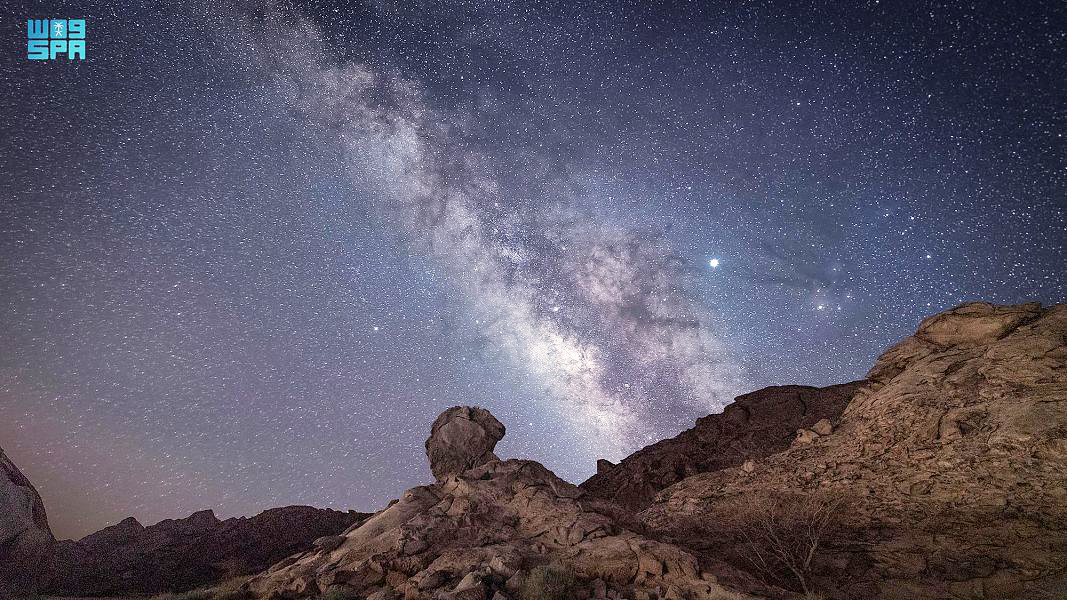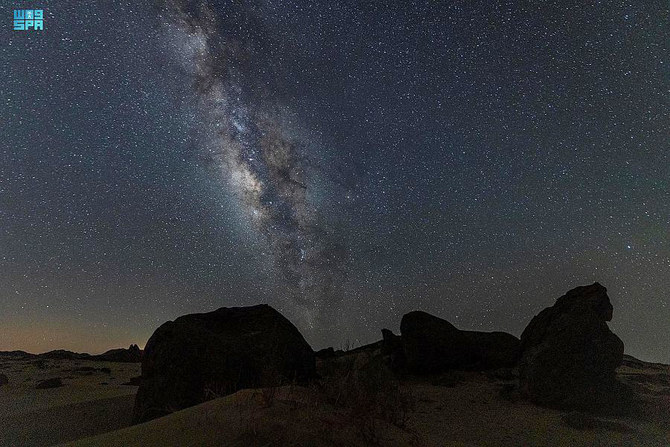JEDDAH: Saudi Arabia’s size and diverse topography make it an ideal location for astronomy enthusiasts. Its mountains, valleys, sand dunes, hills, plains and large deserts are a perfect escape for people trying to avoid the bright city lights to observe the night sky.
Mulham Hindi, an astronomy researcher, told Arab News that the best place to observe the night sky is far away from light pollution caused by human settlements.
“It is also best in locations where cloud cover is low. With its different terrains and huge size, Saudi Arabia is a suitable place for observing stars and even building observatories,” Hindi said.
He added that there are many locations in Saudi Arabia that are perfect places for astronomers and stargazers, citing Bani Malik, 150 kilometers south of Taif as a prime example.
“The (height above sea level) of that mountainous area reduces the percentage of moisture and atmospheric impurity,” he explained. “Its throughout-the-year cloud cover is less than 25 percent.”
Hindi also mentioned Al-Figrah mountain, west of Madinah, as one of the best areas for stargazing, as the mountain stands an estimated 6,000 feet above sea level.
“With their moderate weather, the northwestern regions of the Kingdom — which include AlUla, the Red Sea Projects, and NEOM — are among the areas with the least light pollution, (so) stargazers regularly visit,” he added.
Hindi explained that the observation of the stars and planets is deeply rooted in Saudi culture, particularly in the nomadic lifestyle prevalent in the Arabian Peninsula before the discovery of oil.
“Stars are (mentioned in) many Arabic poems that were composed hundreds of years ago and are still cited today,” he said. “It is also part of Saudi culture to observe stars while moving from one place to another, especially in the desert areas.”
Hindi also noted that the night sky above the Kingdom has become a popular subject for photographers in recent years. “These photographers have enriched exhibitions with very beautiful photos of the starry sky of the Kingdom, its distinctive terrains and heritage sites,” he said.
From a scientific perspective, he pointed out, the development and growing popularity of astronomy have encouraged Saudi astronomers to examine the planets, galaxies and stars more thoroughly than ever before, producing “scientific studies and research (that) can significantly contribute to the study of astronomy.”
A few days before his death earlier this month, the head of the astronomy and space department at King Abdul Aziz University (KAU), Dr. Hasan Asiri, spoke to the Saudi Press Agency about the difference between the three main types of terrain for stargazing in the Kingdom — deserts, plains and mountains.
“Deserts are characterized by their aridity and lack of light pollution. They include the desert of the Empty Quarter, the Nafud desert, Al-Dahna desert and Bajada desert, which is located to the west of Tabuk region,” Asiri said.
He added that plains are characterized by stable atmospheric layers and low temperatures and humidity levels. “These include the plains of NEOM, AMAALA the Red Sea islands, Al-Wajh, Al-Shuaibah and Al-Silaa region located to the south of Al-Wajh province.”
Mountains, he explained, typically offer stargazers clear skies in an environment free of clouds, light pollution and dust. He listed Al-Figrah Mountains, west of Madinah; Taif’s Al-Shafa and Al-Hada Mountains; and Mount “Ral,” near Al-Wajh’s Al-Manjor Center as good spots for astronomers. “Several cities can also be added to the list of sites suitable for observational astronomy, namely the northwestern city of AlUla, which is considered one of the Kingdom’s most prominent tourist destinations, in addition to Hail and Tayma, found to the southwest of the city of Tabuk,” he added.
Asiri said that ‘stargazing tourism’ offers an obvious opportunity for the Kingdom to further diversify its tourism offering as it seeks to boost non-oil industries in line with Saudi Vision 2030.
“This issue interests many people, especially now that the Kingdom is steadily moving forward towards establishing an actual tourism sector and ensuring its sustainability through a comprehensive national development plan,” he said.
“Establishing additional stargazing reserves allows us to create new and exceptional tourist destinations that are at the same time entertaining and educational,” he continued. “It also enables us to organize astronomical events, such as world space weeks or astronomy days, activate public and private space domes, and participate in scientific activities related to astronomical events — such as observing solar and lunar eclipses, shooting stars and planets. This approach would combine science with the joy of observing the night sky.”
The Kingdom is already home to several observatories, he noted, including those in Makkah, Al-Wajh and Halat Ammar, as well as the mobile observatories in Sudair, Tumair, Shaqra, Qassim, Dammam, Madinah and Hail. Meanwhile, the Custodian of the Two Holy Mosques Center for Crescents and Astronomy, located at the top of Makkah’s Clock Tower, is considered the largest network of astronomical telescopes in the world.
According to the head of the Qatif Astronomy Society, Dr. Anwar Al-Mohammed, the Milky Way is one of the best astronomical phenomena to observe.
“It is the galaxy in which our sun and the solar system are located. It (consists of) more than 100 billion solar masses,” he explained. “At night, the Milky Way appears as a band of light in the sky and its appearance differs between one region and another based on the level of light pollution.”
Al-Mohammed noted that the Red Sea Development Company is currently working on turning an area of the Tabuk region between the provinces of Umluj and Al-Wajh into an “International Starlight Reserve,” by limiting the use of unnatural lighting in the Red Sea Project at night.
This, he said, could qualify the area as an International Dark Sky Reserve (a region characterized by “an exceptional or distinguished quality of starry nights and nocturnal environment that is specifically protected for its scientific, natural, educational, cultural, heritage and/or public enjoyment”), which requires the approval of the International Dark-Sky Association (IDA).
If it were to be granted membership, he explained, “it would be joining more than 100 international sites that have abided by strict measures when supporting their communities to achieve this goal, and restore the amazing relationship between mankind and the stars.”































